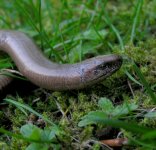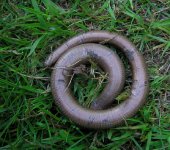-
Welcome to BirdForum, the internet's largest birding community with thousands of members from all over the world. The forums are dedicated to wild birds, birding, binoculars and equipment and all that goes with it.
Please register for an account to take part in the discussions in the forum, post your pictures in the gallery and more.
You are using an out of date browser. It may not display this or other websites correctly.
You should upgrade or use an alternative browser.
You should upgrade or use an alternative browser.
A first in the garden - Slow worm (1 Viewer)
- Thread starter helenol
- Start date
More options
Who Replied?Mickymouse
Ubuntu Linux user
They are great aren't they? Difficult to think of them as Lizards though.
Mick
Mick
Gill Osborne
Well-known member
Wow...what a great find Helen :clap:
A friend of ours found one just a couple of miles away last week in his garden...apparently he had a reporter round from the Northumberland Gazette so it'll be interesting to see if it makes the paper.
I'm keeping my fingers crossed now that I stumble upon one...only reptile I've seen in the UK is an Adder - and that was in 1994!!! :eek!:
Gill
A friend of ours found one just a couple of miles away last week in his garden...apparently he had a reporter round from the Northumberland Gazette so it'll be interesting to see if it makes the paper.
I'm keeping my fingers crossed now that I stumble upon one...only reptile I've seen in the UK is an Adder - and that was in 1994!!! :eek!:
Gill
harry eales
Ancient Entomologist
Gill Osborne said:Wow...what a great find Helen :clap:
A friend of ours found one just a couple of miles away last week in his garden...apparently he had a reporter round from the Northumberland Gazette so it'll be interesting to see if it makes the paper.
I'm keeping my fingers crossed now that I stumble upon one...only reptile I've seen in the UK is an Adder - and that was in 1994!!! :eek!:
Gill
Hello Gill,
Get yourself off to Specsavers,
Harry
Tranquility Base
Registered User
I must just be lucky: I get Common Lizards, Grass Snakes and Adders in my garden. No Slow Worms yet: sad, because they are mes favorites! I used to see them all the time when I lived to the North of Norwich, usually in my compost heap!
helenol said:Saw this today, must admit I wondered what it was at first! A slow worm, right?
Approx. 9" long, and it couldn't half move!
Ummmmmm..................... no thanks!!! :eek!:
bristolbirder
Well-known member
Nice one Helen!
Female by the looks of it. I believe the male has tiny blue spots on its skin.
Steve
Female by the looks of it. I believe the male has tiny blue spots on its skin.
Steve
Jason Alexander
Keeping an eye on wildlife
Great find Helen!
My father in law gets them in his compost bins all the time. We've been experimenting with an infrared camera mounted on the underside of the lid. Have got some good video, but they soon move not long after the camera is switched on. Anyone know if they are sensitive to infrared light?
My father in law gets them in his compost bins all the time. We've been experimenting with an infrared camera mounted on the underside of the lid. Have got some good video, but they soon move not long after the camera is switched on. Anyone know if they are sensitive to infrared light?
Keithec
'Green Scum'
helenol said:Saw this today, must admit I wondered what it was at first! A slow worm, right?
Approx. 9" long, and it couldn't half move!
They can move can't they! Has anyone any theories about their common name? The worm bit is easy to understand as "worm" had a more general meaning in the past and was also applied to snakes ie. something long and thin and alive. The possible origin of the slow element of the name could be "slough" as in the shedding of skin. Any other ideas anyone? Another curious name for them is blind worm which I have come across in old books on natural history.
Keith
Keithec said:The worm bit is easy to understand as "worm" had a more general meaning in the past and was also applied to snakes ie. something long and thin and alive. The possible origin of the slow element of the name could be "slough" as in the shedding of skin. Any other ideas anyone?
There have been a couple of other suggestions-
one of them is that 'slow' comes from a word meaning 'to slay' and it refers either to them 'slaying' earthworms (as they do eat worms) or to a mistaken belief that they could 'slay' humans by stinging with the tail (anyone who's handled one will probably have felt them dig their tail in!)
The most widely accepted one seems to be that 'slow' really does mean 'slow', and that 'slow worm' means 'slow snake', as although they're not that slow-moving, they are slow compared to the other native snakes.
Either way, the name is far too old to be able to find a definite answer, so it's all guesswork, really!
Hindolbittern
Wildlife artist & good egg
Clouseau said:I must just be lucky: I get Common Lizards, Grass Snakes and Adders in my garden. No Slow Worms yet: sad, because they are mes favorites! I used to see them all the time when I lived to the North of Norwich, usually in my compost heap!
I was wondering (and hoping) if they are getting a bit more common. I had one in the garden last year (I'm in North Norfolk), it was the first I had seen since I was a child in the 60s. Everyone I have told about it also said that they hadn't seen one since childhood.
But if Clouseau had loads in his old compost heap, which can't be too many miles from mine, then maybe my theory is unfounded.
I do have common lizards every year - but they tend to be fairly secretive and I only get a few sightings of them. I try and leave the sorts of things I know they like to hang out under as undisturbed as possible so spend most of the time hoping they are there.
Keithec
'Green Scum'
Beany said:There have been a couple of other suggestions-
one of them is that 'slow' comes from a word meaning 'to slay' and it refers either to them 'slaying' earthworms (as they do eat worms) or to a mistaken belief that they could 'slay' humans by stinging with the tail (anyone who's handled one will probably have felt them dig their tail in!)
The most widely accepted one seems to be that 'slow' really does mean 'slow', and that 'slow worm' means 'slow snake', as although they're not that slow-moving, they are slow compared to the other native snakes.
Either way, the name is far too old to be able to find a definite answer, so it's all guesswork, really!
Interesting guesswork though...Your second suggestion makes most sense. Just out of curiosity I looked for clues in a "Dictionary of Archaic Words" published in 1850. Slow Worm was listed as an archaic word!! Its meaning was given as blind worm. There were a number of words beginning with slo... that meant slither etc. all of which could be connected but the most interesting was "Slorry" which in Kentish dialect once meant blind worm.
Keith
Users who are viewing this thread
Total: 2 (members: 0, guests: 2)





